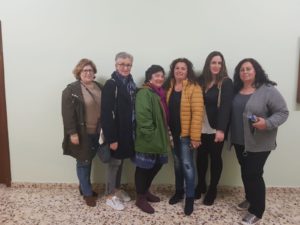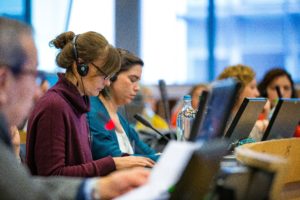Claudia Orlandini
Posts by Claudia Orlandini:
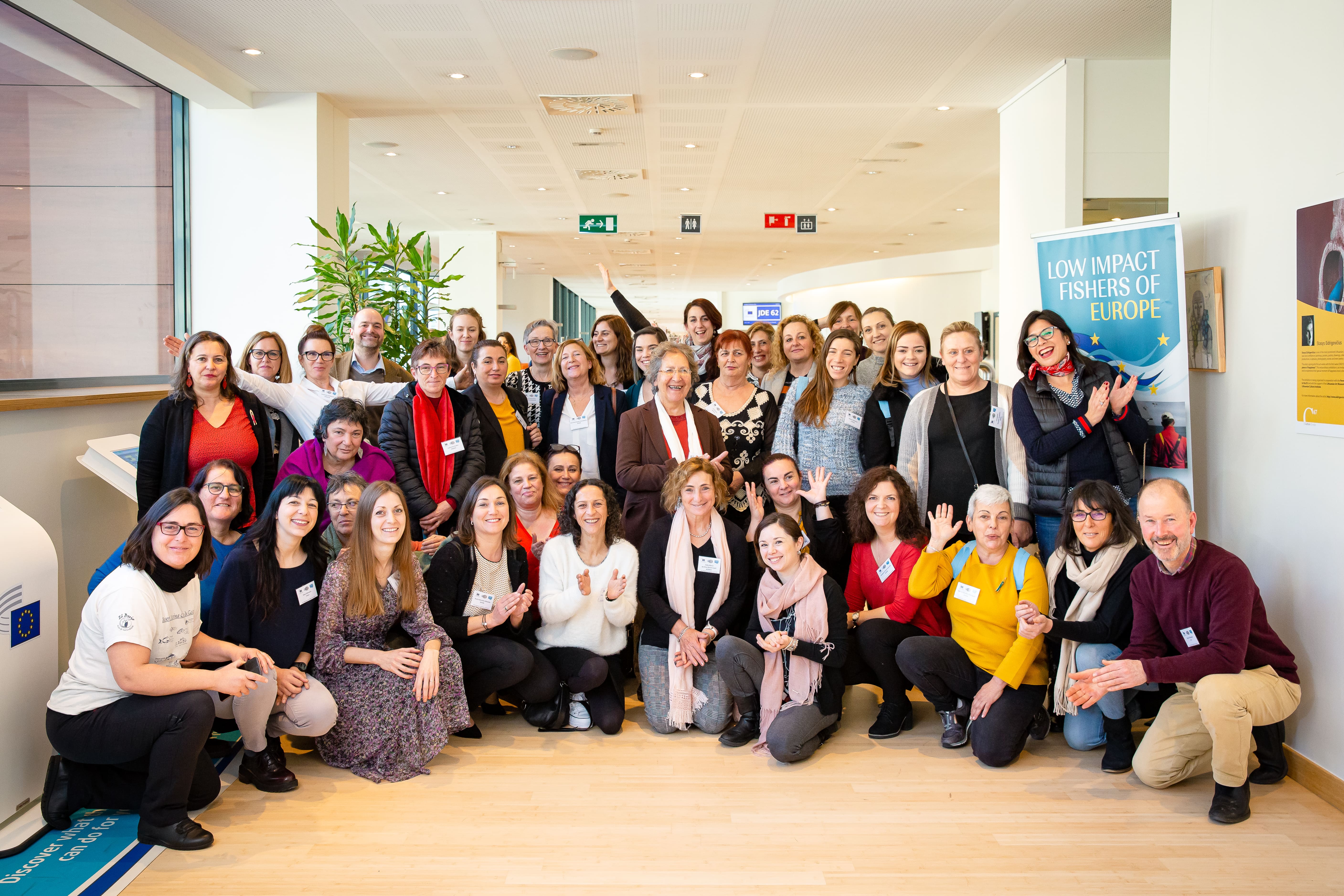
AKTEA’s women conquer Brussels
Recognized, respected and rewarded: Aktea calls for a fair treatment and a voice for women in fisheries and aquaculture
Over 40 fisherwomen from 9 Member States gathered for three days to raise awareness about their work, on the need for gender equality and for their important contribution to European fisheries.
Brussels, Belgium, 27h February 2019 – 40 women professionals from the small-scale fisheries sector, from the Netherlands, Ireland, Spain, Malta, Cyprus, Italy, Croatia, France and the Azores gathered in Brussels over 3 days from the 24 to 26 February, to revive, renew and relaunch the AKTEA European Network of Women in Fisheries and Aquaculture.
Strengthening the organizations of men and women professionals and their participation in governance is a key part the project “Mainstreaming small-scale low impact fisheries in the Mediterranean”, which is implemented by the Low Impact Fishers of Europe (LIFE) with the support of the MAVA Foundation (https://lifeplatform.eu/eu-projects-2/). The pan European meeting was co-organised by AKTEA and LIFE, in partnership with the European Economic and Social Committee (EESC), thanks to this project.
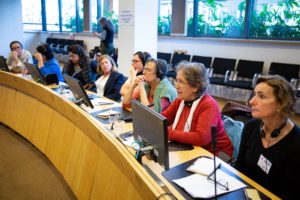 In a video address to the meeting, European Commissioner for the Environment, Oceans and Fisheries, Mr Virginijus Sinkevičius, acknowledged that there is still a long way to go in order to give women the place they deserve. He observed that many family enterprises in the small-scale fisheries sector rely on women for shore based administrative and manual tasks, which are “not remunerated, rewarded or recognized”. This puts women in a very precarious situation, he said. He further stated that it is unacceptable in the 21st century for women to be so strongly underrepresented in formal governance and in the decision-making bodies of professional organizations. He highlighted the potential of the European Maritime and Fisheries Fund (EMFF) to address deficits in gender equality, and underscored his commitment to promoting the social dimension fisheries – including gender equality and the role of women in fisheries in the implementation of the Common Fisheries Policy, which will be reviewed by December 31 2022.
In a video address to the meeting, European Commissioner for the Environment, Oceans and Fisheries, Mr Virginijus Sinkevičius, acknowledged that there is still a long way to go in order to give women the place they deserve. He observed that many family enterprises in the small-scale fisheries sector rely on women for shore based administrative and manual tasks, which are “not remunerated, rewarded or recognized”. This puts women in a very precarious situation, he said. He further stated that it is unacceptable in the 21st century for women to be so strongly underrepresented in formal governance and in the decision-making bodies of professional organizations. He highlighted the potential of the European Maritime and Fisheries Fund (EMFF) to address deficits in gender equality, and underscored his commitment to promoting the social dimension fisheries – including gender equality and the role of women in fisheries in the implementation of the Common Fisheries Policy, which will be reviewed by December 31 2022.
On day 1, participants – shellfish and seaweed gathers, vessel skippers, gear riggers, entrepreneurs engaged in fish processing, marketing and “pesca-tourism”, and fishing family members supporting family enterprises – met informally, got to know about each other’s situations, and began to formulate plans for the future.
Day 2, hosted by the EESC, was devoted to a capacity building workshop, where participants learned about how European fisheries and social policies, if properly implemented, could make all the difference to their livelihoods. Sr Gabriel Sarró Iparraguirre, EESC Rapporteur on the social dimension of fisheries, welcomed the participants. Drawing on his own experience working at sea in the fisheries sector over many years, he explained that it is the womenfolk – wives, mothers and daughters – who give value to European fisheries. They are the driving force and constant source of support to the work done by men he said. Brian O’Riordan, Executive Secretary of LIFE, highlighted how Europe’s fishing policies have become victims of their own success; promoting increased productivity and technological progress, industrial fishing had depleted European seas and marginalised traditional small-scale family based livelihoods, which could make all the difference if given the chance.
Katia Frangoudes, one of the founders of AKTEA in 2006, highlighted how gender equality is a fundamental principle of the European Union, with equal pay for work of equal value included in the 1957 Treaty of Rome. Despite significant progress at European level in recent years on equal treatment policies and legislation, gender mainstreaming, and despite the reaffirmation of gender equality in the Union in the 2007 Lisbon Treaty, gender equality is still a much-neglected area in the fisheries sector at member state level.
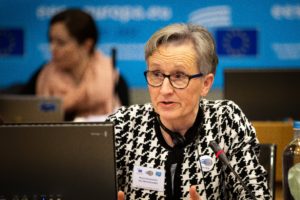 Marja Bekendam, the outgoing Chair of Aktea, highlighted the advances made by women’s organizations over the 10-year period that she has been presiding over Aktea. She emphasised that despite this progress, there is still a long way to go, notably for women to engage more meaningfully in the Advisory Councils, and to become more integrated into other decision-making bodies.
Marja Bekendam, the outgoing Chair of Aktea, highlighted the advances made by women’s organizations over the 10-year period that she has been presiding over Aktea. She emphasised that despite this progress, there is still a long way to go, notably for women to engage more meaningfully in the Advisory Councils, and to become more integrated into other decision-making bodies.
Participants spoke with passion on the need for inclusive fisheries policies based on socio-economic rights, implemented through EU regulations and schemes tailored to allow fair and safe working conditions. As highlighted by Farnet’s representative, recent studies show that women are key drivers of change and diversification of activities (such as in tourism, restaurants or direct marketing), providing an important share of income for their families, but that very often men remain the owner of the business.
The vital importance of women in the traditions and cultural fabric was illustrated in the presentations made by the participants, as well as the significant socio-economic and environmental benefits they generate. Their empowerment and inclusion are prerequisite for the sustainable management of fisheries activities and the conservation of the marine environment. Calls were made for EMFF funding to be channelled into training and capacity building dedicated for women in such areas as IT, accounting, business management and communication. They also saw the need for creating formal associations and organisations to make their voices heard, to take part in decision-making processes, and the need for measures to prevent the disappearance of their profession which is put at risk by the lack of generational renewal.
Women participants spent their final day discussing how to formalise cooperation through AKTEA, and agreeing on priority actions in the short to medium term. Working groups were constituted to develop proposals. The outgoing Chair of Aktea, Marja Bekendam, shared how much Aktea and the solidarity and support she had received over the years had helped her and her family enterprise through difficult times.
A request has been made for a formal meeting with Commissioner Virginijus Sinkevičius in the near future to discuss how the implementation of the CFP can be made more inclusive.
*******
Official pictures of the event here
Access the official presentations made by speakers here: Aktea- Marja Bekendam ; Aktea – Katia Frangoudes ; LIFE – Brian O’Riordan ; Farnet – Gilles Van de Walle ; Amarcarril ; Amarturmar ; Amarturmar II ; Federacion redeiras ; Anmupesca .
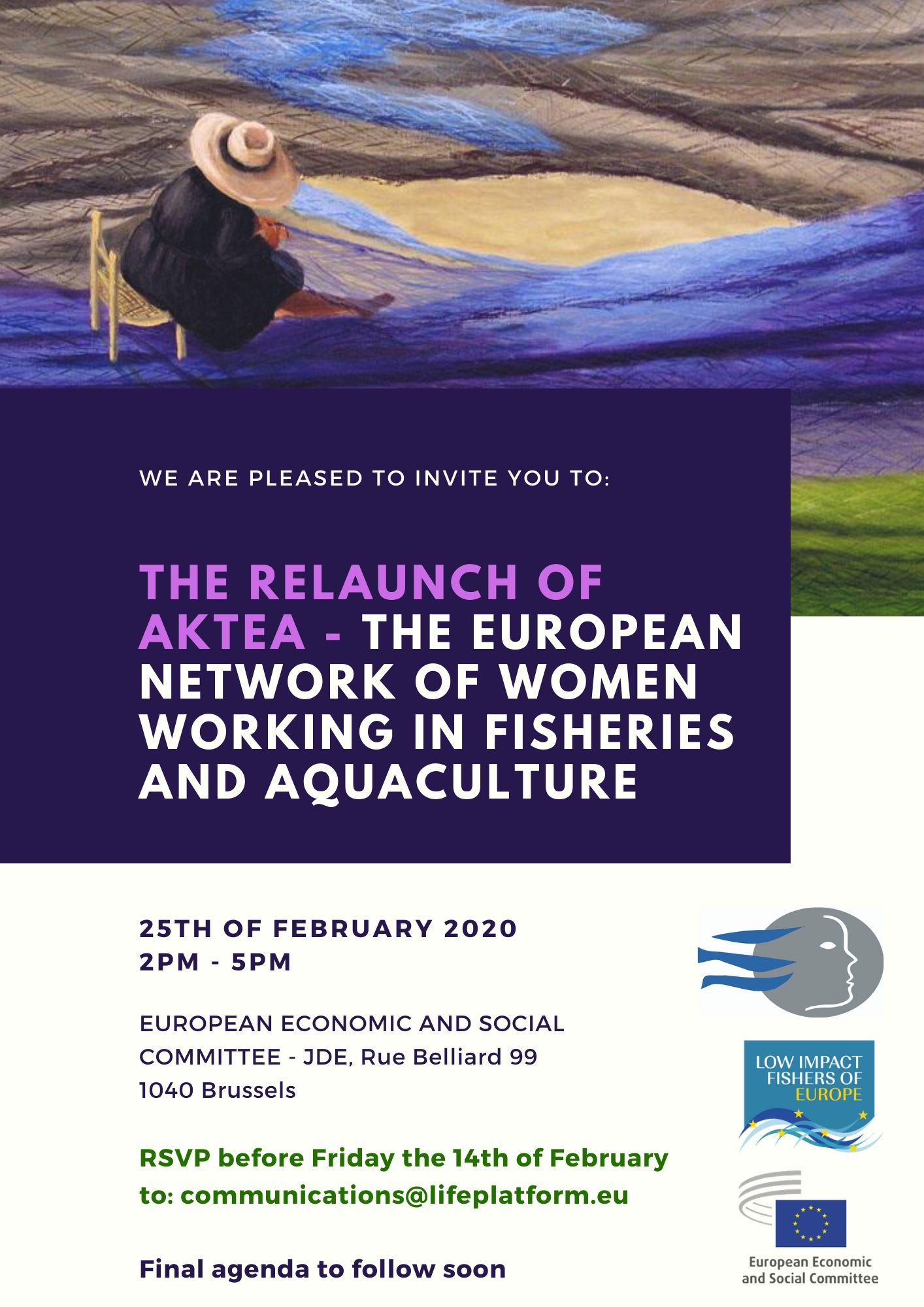
Revive, Renew and Relaunch AKTEA
Fair Treatment for Women in Fisheries: making women visible and valued.
24-26 February 2020, Brussels, Belgium
In partnership with the European Economic and Social Council (EESC) and the Low Impact Fishers of Europe (LIFE), Aktea, the European Network of Women in Fisheries will organize a workshop to raise concerns and propose solutions concerning the unequal treatment between men and women in all areas of fisheries, including employment, working conditions, pay, company assets (including fishing quota) and property (including fishing vessels and equipment).
For more information contact: communications@lifeplatform.eu
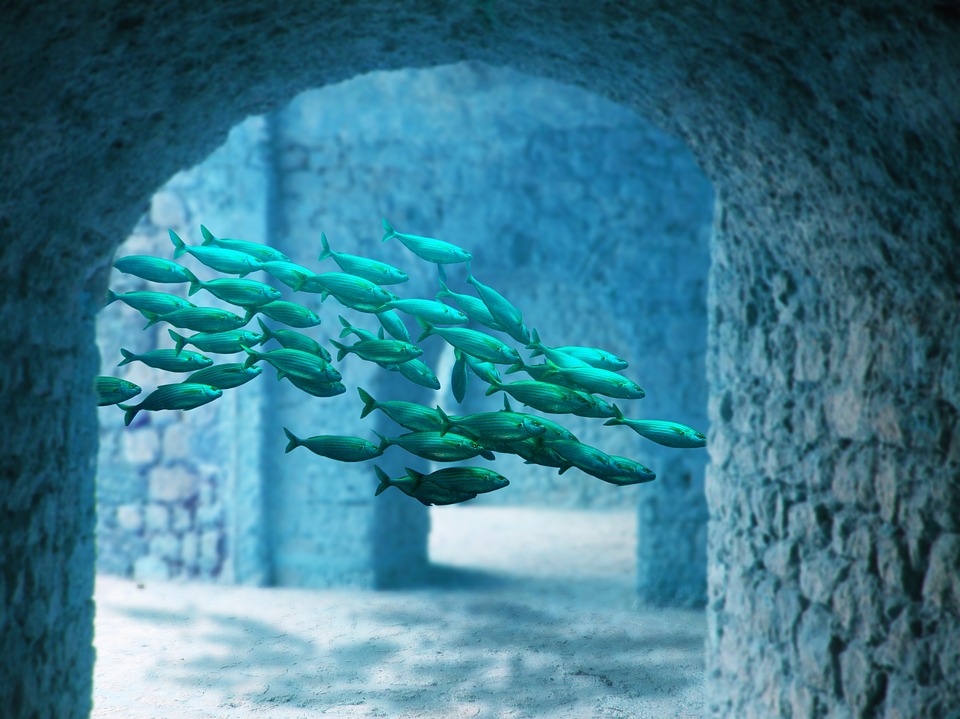
A call to the seafood community
This opinion piece was written by nine women engaged in seafood communities and promoting gender equality: Marie Christine Monfort, President and founder of WSI, (the International Association for Women in the Seafood Industry), Natalia Briceno-Lagos, Project manager at WSI, Meryl Williams Chair of the Gender in Aquaculture and Fisheries Section of the Asian Fisheries Society, Jayne Gallagher, member of WISA (Women in Seafood Australasia), Leonie Noble, Immediate past president WISA, Australian Seafood Hall Inductee, Editrudith Lukanga President of African Women Fish Processors and Traders Network (AWFISHNET), Tamara Espiñeira, coordinator She4sea, Marja Bekendam, President AKTEA and Katia Frangoudes, spokesperson, AKTEA.
A call to the seafood community: time for commitment and change is now!
We are living in a historic moment where the fact that women still participate in society and in the labour market on an unequal footing with men is more topical than ever. The seafood sector, in which at least 100 million women participate but wield little authority, is, like other male-dominated industry sectors, a fertile environment for reform.
Seeking to achieve gender equality and to set up a gender agenda that recognises and empowers women in the seafood industry, many institutions and organisations in the fishing and aquaculture sector globally have organised. While this is an important step, we still need the participation of all relevant seafood actors for real change. Today, we want to call attention and ask the seafood community, private as well as public, to engage more actively in achieving true gender equality.
Where are the women?
The seafood industry is clearly women intensive but “male dominated”. Female workers are consistently over-represented in low skilled, low paid, low valued positions while men dominate the power positions. Women account for more than 15 percent of all those directly engaged in the fisheries primary sector with the percentage exceeding 20 percent in inland water fisheries; they dominate in the labour intensive processing industry, representing 85% to 90% of the total workforce worldwide, play a crucial role in aquaculture with some 30% in salmon farming in Chile, 50% in Zambia, and 72% in Asia. By contrast, the other end of the value chain is the realm of men, with 99% CEOs, 90% board members and leaders of professional organisations.
Participation and visibility
So far, those who have been supporting and working for the visibility of women in this industry and the improvement of their working conditions have been organisations (NGOs and associations) and some trade unions. Among them, the following stand out for example: Women In Seafood Australasia (WISA) which works to build the capacity of women to achieve impact in the development and growth of the seafood industry; the Fisherwomen’s Group of Saga City (Japan), which seeks to process value added seaweed products, is separated from the local cooperative because women in mainstream cooperatives have low status, whereas women in their own groups and businesses have prospered in farming and creating and marketing new value added products; and the Central Fish Processors Association in Barbados which represents mainly women processors of flying fish, has succeeded in securing a dedicated working area in the market to make members’ jobs more efficient.
On the research front, the Gender in Aquaculture and Fisheries Section of the Asian Fisheries Society held every second year a global conference. The “Expanding our Horizons” conference held in October 2018, showcased new and better research methods that empower women, how new technologies can boost women’s productivity, such as tubular nets for seaweed production in Zanzibar, and growing action by women’s groups.
In recent years, female professionals are being made even more visible in the seafood media although often still confined to the section “women in seafood” or “woman of the month”. Initiatives that increase the visibility of women showcasing the diversity and the importance of the role that they play in the industry deserve to be underlined, celebrated and replicated in workplaces! And this is happening. For the first time in 2019, gender discussions will feature in worldwide seafood shows (Boston in March 2019, Brussels in May 2019).
In an effort to bring together stakeholders, the Spanish Ministry of Agriculture and Fisheries held a worldwide congress in November 2018 for and about women in fisheries. The highlight of this event –attended by 200 professionals- was the signature by several countries and organisations of a strongly engaged document including 11 detailed recommendations: The Santiago de Compostella declaration for Equal Opportunities in the Fisheries and Aquaculture Sectors. Aiming to install a gender agenda for the seafood stakeholders, this event is intended to be held every year: Morocco, signatory of this Declaration, has announced to host the second worldwide Women in Fisheries congress in 2020.
Recently, large private companies are claiming their commitment to gender equality by highlighting the existence of their women’s networks. In June 2018 Nueva Pescanova group, Europe’s largest fishing and fish processing company created WIP (Women in Pescanova) to boost the visibility of women, improve working conditions, integration and promotion practices, and support female talent. The Salmon Industry Association of Chile (SalmonChile) has created a working group with the objective of increasing the participation of women in the industry, aiming at gender equity and advancing in the management and identification of gaps. Women in Fisheries is a group of women from Ireland, formed in 2018, to provide a voice and a forum for women from all sectors of their industry.
But are knowledge and talk acted upon?
So we have a new discourse in the seafood community with very women friendly declarations, new actors in this scenario, new documents accrediting commitments in this regard, but are things really changing or in the path to change? The recognition of the importance of women does not mean the acknowledgement of gender based inequalities.
How to ensure the implementation of recommendations towards gender equality proposed by non-binding documents such as the Voluntary Guidelines for Securing Sustainable Small-Scale Fisheries? Such proclamations have a history of slow incorporation into fisheries policy and action. For instance, in three Pacific island countries, a recent study of fisheries management themes in new non-binding regional and international fisheries law found that gender had among the weakest uptake, receiving attention in only 3 out of 15 national level policies, compared to 15 for sustainability. The reasons for this stemmed from a lack of familiarity with the concept of gender equality and ambivalence as to its importance.
Gender inequalities still pervasive
Power distribution is highly unbalanced and in almost all countries, the gender pay gap is still large. One of the causes for the gender pay gap is that strong stereotypes prevent women applying to certain “male” jobs, fishing being one example, and supervisor and manager positions others. The gender stereotyping can lock women into lower paying jobs but, even when job level is accounted for, often women are paid less for doing the same job. Pregnancy and motherhood are still considered in many companies as an economic burden and prevent women from securing steady jobs.
The gender blind distribution of public spending in the seafood economy misses opportunities to challenge the gender imbalance and consolidates gender inequalities. For example, fisheries government budgets and international development funding goes predominately to the catching sector rather than processing and marketing. In countries where small scale fishers are numerous, this means little help for those parts of the value chain where women dominate. In marketplaces, modernisation has frequently squeezed women out of their stalls in the old markets as the new markets cater to larger, typically male dominated, operators. In India, cases have been documented in Mumbai and Bihar where women have resorted to selling on footpaths and beside busy roads.
Understanding seafood industry through gender equality lens
As longtime members of associations grappling with this issue, we are buoyed by the current interest but also sanguine that change is not guaranteed.
Here are four tips. First, women in the industry will need to challenge their positions and articulate what they need by means that work in their cultures. This means working together and not allowing to be treated as second class nor simply emulate men in their work by, for example, keeping other women in their secondary places. Second, people already working on gender equality in the seafood industry have to raise the level of comprehension of other professionals on why gender equality is important to the seafood industry. This is not a once-only effort but requires regular, even dogged proselytising at each opportunity. Third, the capacity of professionals to create new visions of a gender equitable industry has to be raised by training and capacity building. How could gender equality look and what steps would lead to it? Finally, a progressive environment should not be viewed as a women’s own issue but one that obliges and encourages men’s engagement.
The challenge is great but not impossible! There are already several reports of successful experiences in improving the conditions of women in our industry. As last year, 2019 will be a historic year for our cause! We will be many more and stronger, better organised and connected! We urgently invite seafood players to join this crusade that concerns us all so that next March 8 we can be talking about a much more and truly inclusive industry.
Source:
https://www.worldfishing.net/news101/Comment/analysis/ending-seafood-industrys-gender-inequality
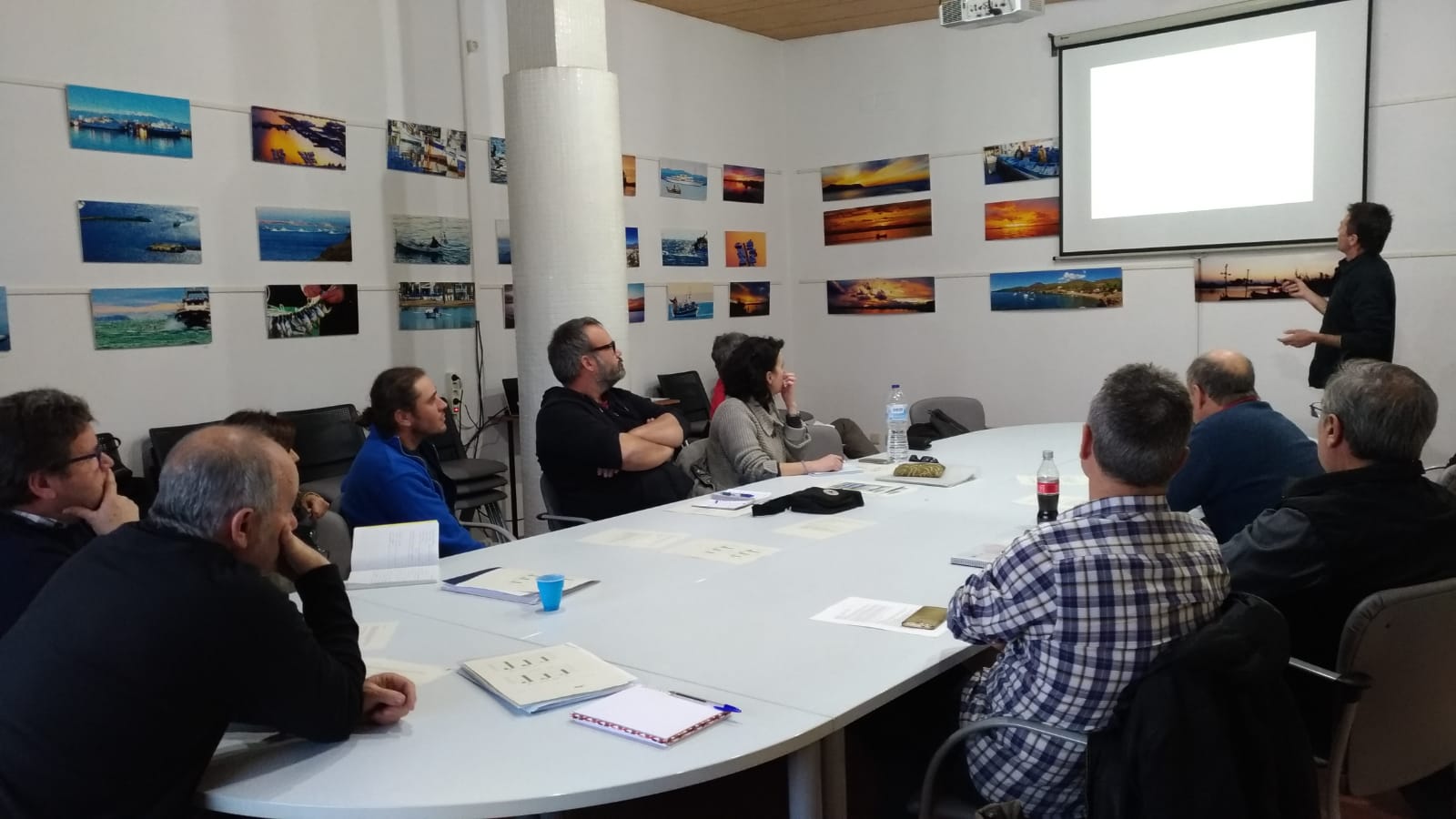
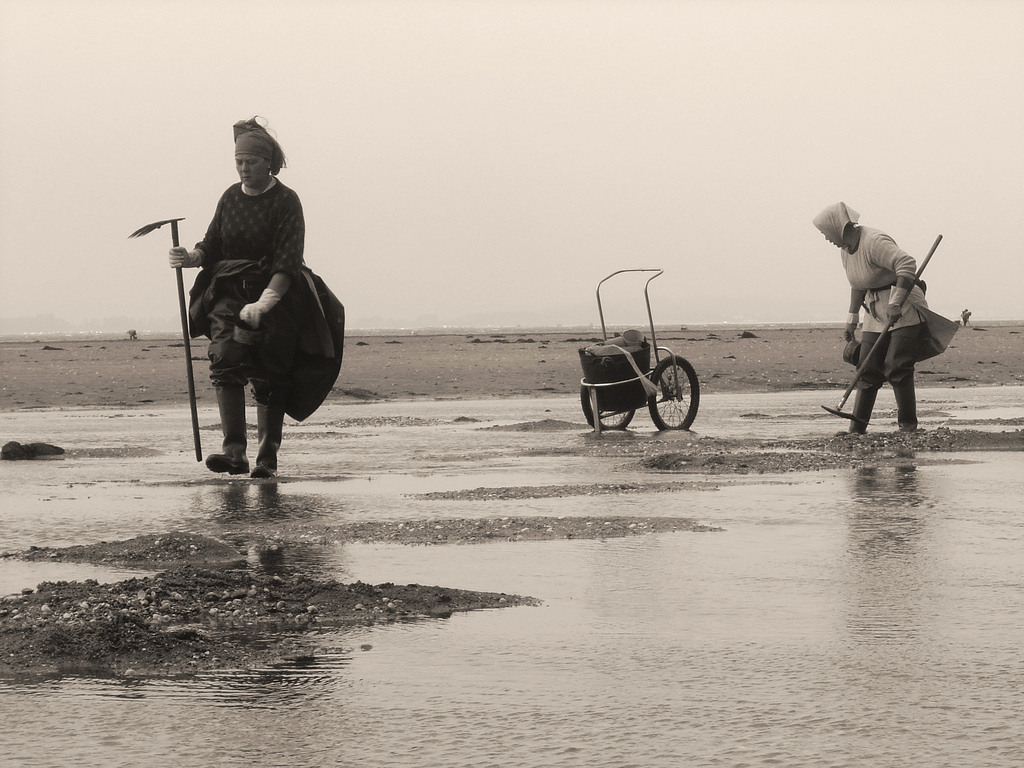
International Conference in Santiago: check the conclusions!
On the 5th and 6th of November 2018 the First International Conference on Women in Fisheries organized by the Spanish government in Santiago de Compostela took place. AKTEA’s representatives attended as panelists and explained the advocacy work they are doing to promote gender equality. The conclusions of this important event are now online!
Access the “Conclusions and Publications” in English, French and Spanish here

Mulleres do Mar de Arousa: entrevista a Sandra Amézaga
«El del mar sigue siendo un mundo de hombres donde es difícil entrar»
Accede al artículo de la Voz de Galicia haciendo clic aquí
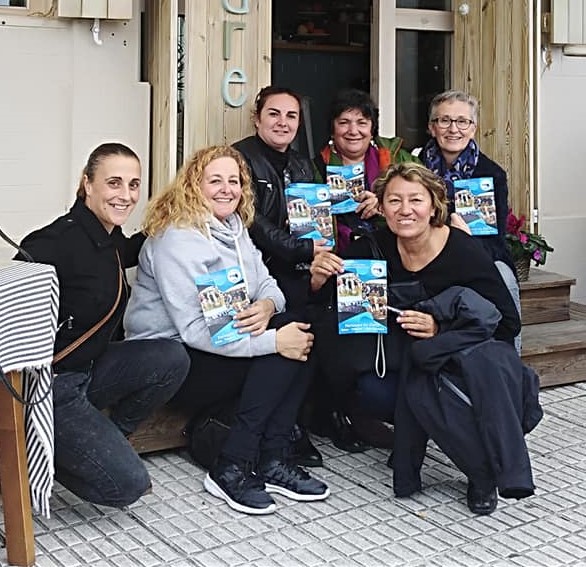
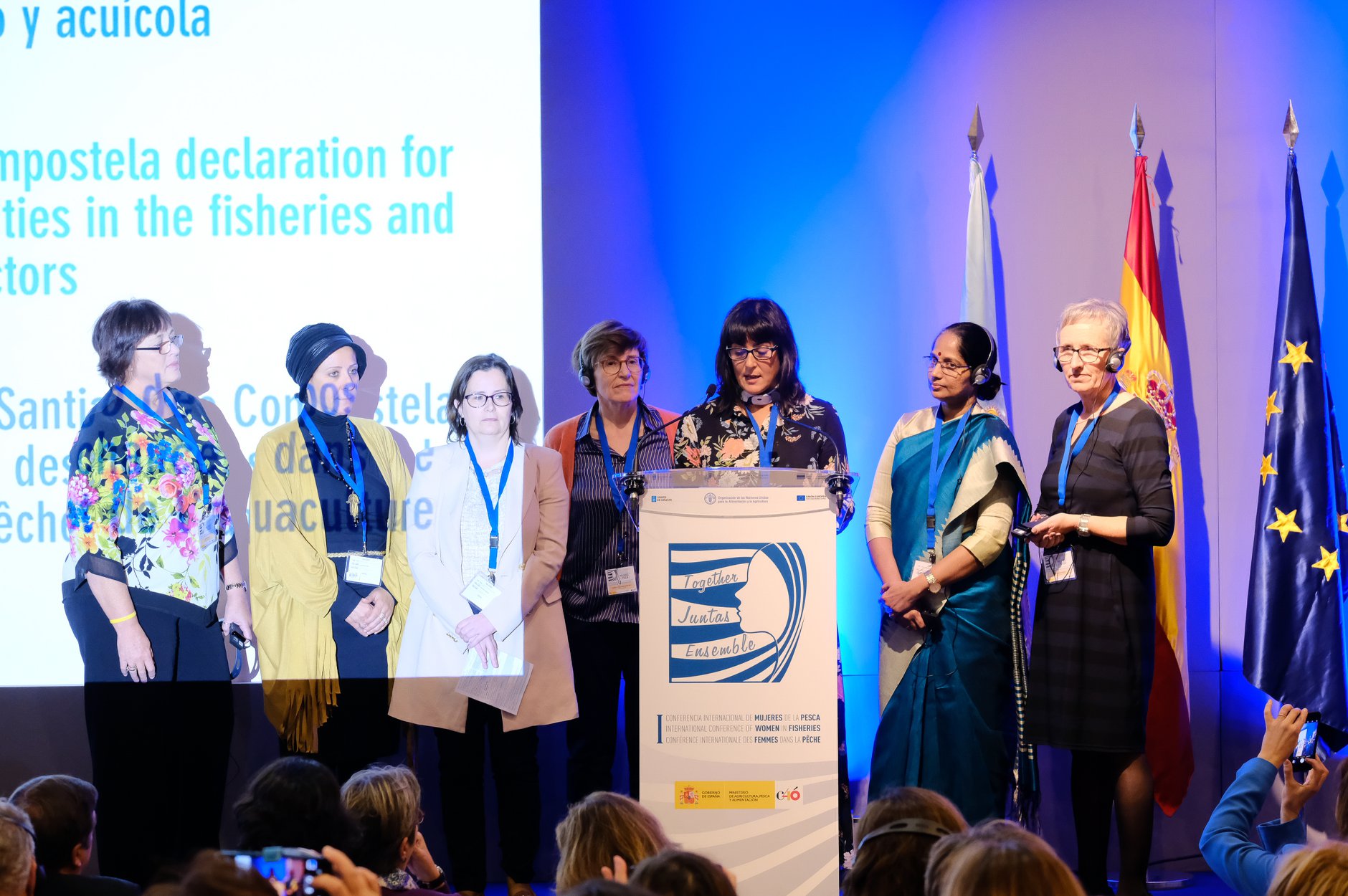
First International Conference on Women in Fisheries in Santiago de Compostela
November 2018
On the 5th and 6th of November Katia Frangoudes and Marja Bekendam represented AKTEA at the First International Conference on Women in Fisheries organized by the Spanish government in Santiago de Compostela. The conference started with the presentation of the “Santiago de Compostela Declaration” for Equal Opportunities in the Fisheries and Aquaculture Sectors.
The Press Release is available here: https://www.mapa.gob.es/es/prensa/181105declaracionconferenciamujerespesca_tcm30-485039.pdf
Marja Bekendam states: “This declaration is a recognition of women’s work at sea and ashore. We hope to hear how it will lead to a formal recognition of the work women do. The implementation of directive (2010/41/EU) would be a great step forward for women who work with different tides, in all kinds of weather and working conditions every day”.

AKTEA visited two women organisations in Galicia
November 2018
Prior to the International Conference of Women in Fisheries in Santiago de Compostela (November 2018), Katia Frangoudes and Marja Bekendam, representing AKTEA, visited two members organizations of the network in Galicia: Amarcarril and Mulleres Mar Arousa.
The association Amarcarril, based in Carril, gathers mariscadoras of the community who are, inter alia, organising visits for tourists and schools to explain their work and also the functioning of shore ecosystem. The association also created an exhibition room in the building of the auction where they show photos of shellfish harvesting as well as the main tools to practice such activity. Posters and other products are used 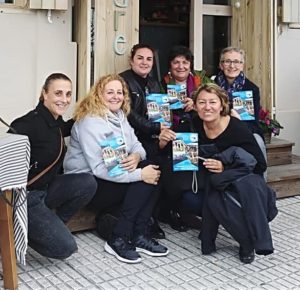
Later in the afternoon AKTEA’s representatives visited the association of Mulleres Mar Arousa in Villa Nova. This 